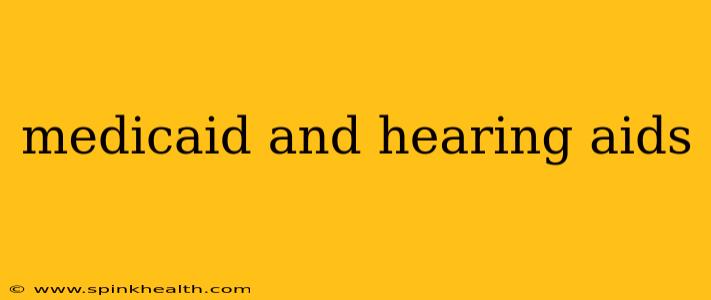Losing your hearing can feel like losing a piece of yourself. The world becomes muffled, conversations become strained, and the simple joys of life—birdsong, laughter, music—fade into the background. For many, hearing aids offer a lifeline back to clearer sound and fuller participation in life. But the cost can be prohibitive. This is where Medicaid, the joint federal and state healthcare program for low-income individuals and families, comes into play. The journey to securing hearing aids through Medicaid is not always straightforward, however, and understanding the intricacies is key. Let's unravel the complexities together.
Does Medicaid Cover Hearing Aids?
This is the million-dollar question, and the short answer is: it depends. Medicaid coverage for hearing aids varies significantly from state to state. There’s no national standard. While some states offer comprehensive coverage, including the cost of the devices and fittings, others offer limited or no coverage at all. Your eligibility hinges not only on your income and resources but also on your state's specific Medicaid plan and its benefit package. Think of it like a patchwork quilt; each state's coverage is a unique piece.
What Factors Determine Medicaid Hearing Aid Coverage?
Several factors influence whether you'll receive Medicaid coverage for hearing aids:
- Your State's Medicaid Program: As mentioned, each state administers its own Medicaid program with its own set of rules and regulations. Some states may cover hearing aids for adults, while others only cover them for children. Some might cover only a portion of the cost.
- Your Income and Resources: You need to meet your state’s income and resource requirements to qualify for Medicaid in the first place. Even if your state covers hearing aids, you must still meet these thresholds.
- Your Specific Needs: Medicaid often prioritizes medically necessary services. Your doctor will need to determine that hearing aids are medically necessary for your health and well-being. This usually involves a comprehensive hearing evaluation.
- The Type of Hearing Aid: Some states may restrict coverage to specific types or models of hearing aids. They might favor less expensive options or those deemed "medically necessary" by their standards.
How Can I Find Out if My State Covers Hearing Aids Through Medicaid?
Navigating this process can feel overwhelming, but there's a clear path to finding the answers you need:
- Contact Your State's Medicaid Office: This is the most reliable source of information. Their website should have contact information, often including phone numbers and email addresses.
- Check Your State's Medicaid Website: Many state Medicaid websites provide detailed information about covered services, including hearing aids. Look for a section on "benefits" or "covered services."
- Consult Your Doctor: Your primary care physician or an audiologist can also provide guidance on navigating Medicaid's hearing aid coverage in your state. They often have experience assisting patients with similar situations.
What if Medicaid Doesn't Cover Hearing Aids in My State?
Don't despair! Even if your state doesn't offer coverage, there are still options available to make hearing aids more affordable:
- Hearing Aid Manufacturers' Programs: Some manufacturers offer financial assistance programs or payment plans to help make hearing aids more accessible.
- Local Charities and Nonprofits: Many organizations provide assistance to individuals with hearing impairments, sometimes offering financial support for hearing aids.
- Private Insurance: Check your private health insurance policy to see if it covers hearing aids, either partially or fully.
What Documents Do I Need to Apply for Medicaid Hearing Aid Coverage?
The required documents vary by state, but generally include:
- Proof of income and assets.
- Medical documentation of your hearing loss. This typically includes an audiogram and a referral from your doctor or audiologist recommending hearing aids.
- Proof of identity and residency.
The journey to better hearing can be challenging, but understanding the intricacies of Medicaid coverage for hearing aids is the first step towards a solution. Remember to be patient, persistent, and proactive in seeking information specific to your state's program. Your improved hearing and enhanced quality of life are worth the effort.

